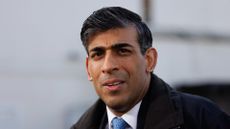What does Reform UK stand for?
Founded as a single-issue Brexit campaign group, Reform UK is now polling in the double-digits

Labour made headlines with a thumping victory in the Blackpool South by-election, producing a 26% vote swing to unseat the Conservatives.
But the result was remarkable for another reason. The Tory candidate David Jones was only 118 votes away from being knocked into third place by Reform UK's Mark Butcher, a fact that's "certain to give an awful lot of Tory MPs the collywobbles", said Politico.
Amid a huge downturn in support for the Tories, their vote "fell most heavily in those wards where Reform fielded a candidate", said Professor John Curtice in The Telegraph. The Conservatives' saving grace is that Reform "only contested one in six of the wards where there was an election", wrote the polling expert. A "full slate" of challengers would have been "even more devastating".
Subscribe to The Week
Escape your echo chamber. Get the facts behind the news, plus analysis from multiple perspectives.

Sign up for The Week's Free Newsletters
From our morning news briefing to a weekly Good News Newsletter, get the best of The Week delivered directly to your inbox.
From our morning news briefing to a weekly Good News Newsletter, get the best of The Week delivered directly to your inbox.
Reform UK's leader Richard Tice said the results showed his party was "rapidly becoming the real opposition to Labour in the North and Midlands", said the Daily Express.
What is Reform UK?
Founded by Nigel Farage in 2018 as the single-issue Brexit Party, the party rebranded as Reform following the UK's formal departure from the EU at the start of 2020.
Initially focused on anti-lockdown messages during the pandemic before pivoting to broader right-wing populist themes, Reform has surged in the polls over the past year. March marked a new milestone when Lee Anderson, formerly the Conservative member for Ashfield in Nottinghamshire, announced his defection and became Reform's first sitting MP.
Farage, honorary president of Reform UK, attributed the party's revived political fortunes to its ability to offer an alternative to a Westminster elite who "speak an entirely different language to those who live in the real world", said The Telegraph.
What are its main policies?
Reform UK has a populist agenda aimed at attracting voters from both the left and right who are frustrated with the two main parties and feel strongly about issues such as immigration and the costs of net zero.
At the time of its relaunch, Farage and Tice said the party would take on what it saw as "powerful vested interests", identifying the House of Lords and the BBC in particular. "Badly run, wasteful quangos", the Home Office, the "way we vote, law and order, immigration" were all areas they also wanted to "reform".
Today, "the four policies it touts the most are lower taxes, net zero immigration, cheaper energy, and zero waiting lists", said Sky News.
It has taken a particularly hard line on immigration, calling for the UK to leave the European Convention on Human Rights, and use offshore processing centres for illegal immigrants and prevent them from claiming asylum. On energy, the party wants to scrap net zero plans and instead increase drilling for gas and oil. Other policies include "offering vouchers to go private if you can't see a GP in three days, scrapping interest on student loans, increasing police numbers, keeping 'woke ideologies out of the classroom', abolishing the TV licence fee, reforming the Lords and reducing 'wasteful spending'.
The party's slogan "Let's Make Britain Great" deliberately harks back to Donald Trump's "Make America Great Again" and there are strong parallels with the types of voters both are trying to win over.
Reform is targeting "working-class communities that historically voted Labour", said Rachel Cunliffe in The New Statesman in the aftermath of Anderson's defection. These are the voters who "backed Brexit, gave Boris Johnson a chance in 2019, but who are now feeling abandoned and deeply disappointed".
Will it impact the election?
Over the past year, the proportion of Brits who intend to vote for Reform UK in the next general election has leapt from 5% to 12%, according to Politico's Poll of Polls.
Despite polling consistently in double digits nationally – and ahead of the Lib Dems – Reform still lacks a charismatic campaigning figurehead to turn those votes into seats in Westminster. Anderson's defection was "unquestionably a significant blow" for the Conservatives, said the BBC's political correspondent Henry Zeffman, but he is "not exactly a major national figure".
Reform "is still underperforming" compared to Ukip at its peak, said The Independent, and some commentators have suggested the surge in its vote share "says more about a collapse in Tory support" than a nation hungry for Tice and Farage's vision.
Create an account with the same email registered to your subscription to unlock access.
Sign up for Today's Best Articles in your inbox
A free daily email with the biggest news stories of the day – and the best features from TheWeek.com
-
 'The House GOP is begging to lose their majority'
'The House GOP is begging to lose their majority'Instant Opinion Opinion, comment and editorials of the day
By Harold Maass, The Week US Published
-
 Pig kidney transplant recipient dies
Pig kidney transplant recipient diesSpeed Read Richard Slayman has passed away two months after undergoing the historic procedure
By Peter Weber, The Week US Published
-
 Putin replaces defense minister with economist
Putin replaces defense minister with economistSpeed Read In a surprising shake-up, Putin replaced Sergei Shoigu with civilian economist Andrei Belousov
By Peter Weber, The Week US Published
-
 Summer Lee, the Pennsylvania 'squad' member who beat back a primary challenge
Summer Lee, the Pennsylvania 'squad' member who beat back a primary challengeIn the Spotlight Lee is the first Black woman ever elected to Congress from the Keystone State
By Justin Klawans, The Week US Published
-
 How will honeytrap scandal change Westminster?
How will honeytrap scandal change Westminster?Today's Big Question Security procedures laid bare by spear phishing attack as focus shifts to 'political insider' being responsible
By The Week UK Published
-
 Ronna McDaniel, the former RNC chair and departed NBC analyst, may be signaling a shift in corporate media
Ronna McDaniel, the former RNC chair and departed NBC analyst, may be signaling a shift in corporate mediaThe Explainer McDaniel joined NBC less than a month after stepping down from the RNC — and was out days later
By Justin Klawans, The Week US Published
-
 Will Aukus pact survive a second Trump presidency?
Will Aukus pact survive a second Trump presidency?Today's Big Question US, UK and Australia seek to expand 'game-changer' defence partnership ahead of Republican's possible return to White House
By Sorcha Bradley, The Week UK Published
-
 Can Boris Johnson save Rishi Sunak?
Can Boris Johnson save Rishi Sunak?Today's Big Question Former PM could 'make the difference' between losing the next election and annihilation
By The Week UK Published
-
 Liz Truss and her bid to woo the American far-right
Liz Truss and her bid to woo the American far-rightWhy Everyone's Talking About Former PM pitching herself as 'bridge in transatlantic conservative movement'
By The Week UK Published
-
 It's the economy, Sunak: has 'Rishession' halted Tory fightback?
It's the economy, Sunak: has 'Rishession' halted Tory fightback?Today's Big Question PM's pledge to deliver economic growth is 'in tatters' as stagnation and falling living standards threaten Tory election wipeout
By Harriet Marsden, The Week UK Published
-
 Why your local council may be going bust
Why your local council may be going bustThe Explainer Across England, local councils are suffering from grave financial problems
By The Week UK Published